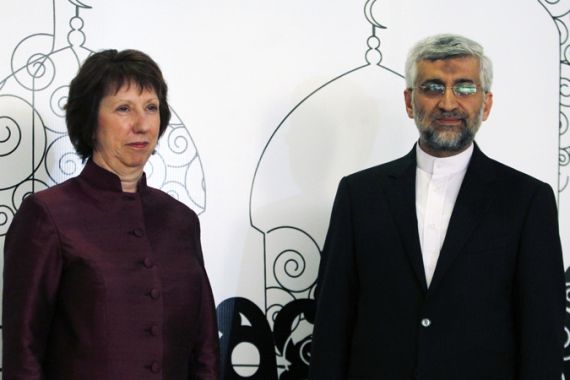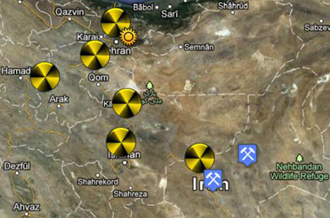Iran says nuclear talks lack common ground
Official says points of agreement not yet sufficient after world powers deliver package of proposals at Baghdad meeting.

World powers and Iran have “not yet sufficient” grounds for an accord permitting another round of talks after the current round in Baghdad, an Iranian official has said as negotiations looked set to enter a second day.
Wednesday’s talks in Baghdad were the second round in the latest series between the P5+1 group of world powers and Iran over the Islamic Republic’s controversial nuclear programme, with earlier negotiations held in Istanbul last month.
“The points of agreement are not yet sufficient for another round,” the official said on condition of anonymity, adding that the world powers had to “revise” a package of proposals made earlier on Wednesday.
“We believe that the two parties must agree on common points to merit a new round of negotiations. The necessary foundation needs to be built. Common points must be agreed in Baghdad.”
The official said, however, that “the Western parties want to continue these negotiations at any cost. This is not our position”.
Iran insists its nuclear programme is peaceful, but Western powers suspect it is masking attempts to join the elite club of nations with nuclear weapons.
Earlier Catherine Ashton, EU foreign policy chief, presented a package of new incentives on behalf of the P5+1 – Britain, China, France, Russia and the United States, plus Germany.
Detailed proposals
Iranian state media ran reports attacking the P5+1 package, with the IRNA news agency calling it “outdated, not comprehensive, and unbalanced”.
Ashton’s spokesman gave no details on what the incentives included but reports said they fell short of meeting Iran’s key demand for an easing of the sanctions piled on the country in recent years – more are due on July 1.
Both said reportedly exchanged unusually detailed proposals in Baghdad in hopes of defusing the standoff.
| INTERACTIVE | |||
|
After a 15-month diplomatic freeze and exploratory talks in Istanbul last month, envoys for Iran and the P5+1 group convened with both sides publicly upbeat about the scope for an outline deal.
“We had a detailed exchange this morning,” said a Western diplomat who spoke of the six powers presenting a “package” of proposals in the morning. “The atmosphere was businesslike.”
In the afternoon, another diplomat said, Iran reacted to the offers and “also broadened out the discussions to touch on other areas we see as non-core issues”.
Iranian media close to the government said its chief negotiator Saeed Jalili presented a five-point package covering a “comprehensive” range of nuclear and non-nuclear issues.
The official news agency IRNA sounded a note of discord by quoting Iranian officials as referring to the big-power proposal as “nitpicking” while student news agency ISNA said: “Apparently from the Iranian point of view this package is not balanced.”
However, those leaks did not appear to be Tehran’s final response as the talks ran on into the evening.
The powers’ overall goal is an Iranian agreement to curb uranium enrichment in a transparent, verifiable way to ensure it is for peaceful purposes only. Iran’s priority is to secure an end to sanctions isolating the country and damaging its economy.
Higher-grade enrichment
The pivotal proposal by the P5+1 group was for Iran to halt its enrichment of uranium to the higher fissile concentration of 20 per cent, her spokesman Michael Mann said as talks got under way.
That is the Iranian nuclear advance most worrying to the West since it largely overcomes technical obstacles to reaching 90-per cent, or bomb-grade, enrichment.
“We have a new offer on the table which addresses our main concerns about the Iranian nuclear programme. The 20-per cent enrichment question,” Mann said.
“We hope the Iranians respond positively and we can make progress today.”
In a separate interview with Iran’s state-run English-language Press TV, Mann said no final deal was expected in Baghdad because progress was likely to be only gradual.
He said toughened sanctions, especially an EU ban on Iranian oil exports due to take full effect on July 1, had helped to draw Iran finally into serious negotiations.
